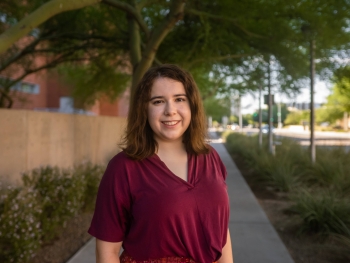Undergraduate named SOLUR Scholar for work on artificial intelligence
Megan Nelson, a third-year undergraduate in the Department of Psychology and a student in Barrett, The Honors College at Arizona State University, is changing how artificial intelligence and computational modeling are used to understand behavior.
She was recently selected as a SOLUR Scholar by the School of Life Sciences for her work. The SOLUR Scholar is a paid position where students work with a faculty member on a research project and also participate in a weekly seminar with other students in the cohort. Throughout the year, the scholars attend research symposiums and present their research findings at conferences.  Megan Nelson, a third-year undergraduate in the Department of Psychology and a student in Barrett, The Honors College at Arizona State University, is changing how artificial intelligence and computational modeling are used to understand behavior. Download Full Image
Megan Nelson, a third-year undergraduate in the Department of Psychology and a student in Barrett, The Honors College at Arizona State University, is changing how artificial intelligence and computational modeling are used to understand behavior. Download Full Image
As a member of the SOCIAL (Study of Circuits in Adolescent Life) Neurobiology lab with Assistant Professor Jessica Verpeut, Nelson helps study the development of neural circuits and structure in early life to understand behavior. She is majoring in psychology and biological sciences with a concentration in neurobiology, physiology and behavior. Additionally, she is minoring in math and earning a certificate in computational life sciences.
“Currently, I’m interested in cerebellar perturbations on social behavior in adolescent mice,” Nelson said. “Previously, the effect of cerebellar injury has been linked to autism in clinical studies. Some other studies have tested the effects of cerebellar injury on a wide variety of behaviors, like associative learning, anxiety-like behaviors and even social behavior.”
One of the major challenges of studying social behavior in animal models is that it is so complex and there are so many contextual variables and body parts involved.
“Social behavior hasn't been able to be tracked super well until extremely recently with the development of machine learning algorithms,” Nelson said. “The rise of these machine learning algorithms also allows us to use different tests to measure social behaviors that were previously impossible.”
Nelson presented her initial research findings last year at the Arizona Psychology Undergraduate Research Conference and has since expanded her research into computational modeling.
She is hoping to use this year as a SOLUR Scholar to gather more research and develop new models and algorithms to better understand the social behavior of adolescent rats. At the end of the year, she will present her findings at the School of Life Sciences Undergraduate Research Symposium.
Long term, her goal is to go to graduate and earn a PhD in neuroscience to further investigate the origins of social behavior.
“If I was given unlimited resources to investigate a question further, I would be interested in studying the role of genetics or specific genes on the development of the brain. I’d like to understand the genetic connections and see how developmental changes in behavior start on a genetic level,” Nelson said.

Gift to Watts College's Action Nexus will fund staff to assist residents in need
Veterans and others who can no longer afford their rent or are experiencing homelessness will be able to share housing costs with a roommate in a new matching program administered by the Arizona State University Action Nexus on Housing and Homelessness.
A three-year, $750,000 gift from the Garcia Family Foundation will support the Action Nexus, based at the ASU Watts College of Public Service and Community Solutions, on the shared housing pilot program and three others.  Photo by Samuel Ryde/Unsplash Download Full Image
Photo by Samuel Ryde/Unsplash Download Full Image
The other three programs involve working with federal officials to allow temporary housing to be built on land the U.S. government administers in Maricopa County near the Phoenix metro area; establishing a Lived Experience Advisory Council, made up of people who currently or formerly experienced homelessness who can advise assistance providers on the most acute needs; and an evaluator who can help organizations set metrics and track goals, said Shana Ellis, executive director of the Action Nexus.
Rents rose by nearly 30% in the Phoenix area in 2021, more than double the U.S. average, and early projections are for them to increase nearly 20% more this year, according to a March Arizona Republic article. The Pew Research Center recently found that 31.9% of American adults live in some form of a shared household, said Krickette Wetherington, Action Nexus project manager.
“Helping people who are experiencing housing insecurity find reliable options is at the core of what the Action Nexus on Housing and Homelessness was established to do,” said Watts College Dean and President’s Professor Cynthia Lietz. “The Action Nexus is founded on the belief that all persons deserve a secure, welcoming environment where they can positively influence the world around them and accomplish their aspirations. Each of these efforts is designed to achieve exactly that.”
Potential roommates will be required to complete a questionnaire similar to the intake forms used by roommate matching services, Ellis said, except that, rather than just being about seeking a roommate, the intended match would include a case manager offering services particular to each roommate’s needs to ensure the match was successful.
Based on responses from applicants, such as how they feel about having pets in a home and how loudly music should be played, housemates would be matched in rental properties available through agreements with landlords facilitated by HOM Inc, which helps vulnerable individuals and families find affordable housing, Ellis said. Those paired will live in the same residence but in separate bedrooms.
Ellis said money from the gift will cover two new full-time positions: a shared housing coordinator and evaluator. The funds will also pay for hiring a half-time staff member to work with federal officials, a graduate student to work about 15 hours per week with the advisory council and faculty stipends for research, as well as operating expenses.
Money for rent is not part of the shared housing gift. Wetherington said funds for that purpose, if needed, would come from other sources, which will also pay for conflict resolution services to assist any housemates who encounter difficulty with their living arrangements.
While the Action Nexus program will initially center on veterans, officials hope it will expand soon to include others, such as youth aged 18 to 24. Apartments are expected to provide most of the housing, but other options will be considered, Wetherington said.
“The goal is to create a system so anyone experiencing homelessness will have access to shared housing,” she said.
Jon Ehlinger, president of the Garcia Family Foundation, said his organization agreed to fund staffing necessary to administer these programs.
Maricopa County is experiencing a major housing shortage, and housing security advocates need help finding places to live for many people who must leave their current homes because of huge recent rent hikes, Ehlinger said. Service providers like the Action Nexus want to do more to help individuals in need of housing, but current staffing levels leave little time to take on new efforts like shared housing, he said.
“This will give them the bandwidth to push it more quickly. The affordable housing need is very acute right now,” Ehlinger said. “Shared housing doesn’t involve building anything. Places are already built, so if you can find people willing to move in with other people, you’re helping solve the problem now, rather than waiting for more housing to be built.”

"behavior" - Google News
September 26, 2022 at 10:17PM
https://ift.tt/AiFVHzX
Using machine learning to analyze social behavior - ASU News Now
"behavior" - Google News
https://ift.tt/QwF6JGl
Bagikan Berita Ini














0 Response to "Using machine learning to analyze social behavior - ASU News Now"
Post a Comment